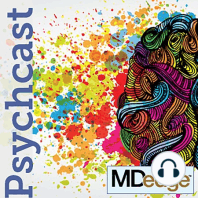7 min listen

Managing the anxiety tied to COVID-19, virtual learning, and school/college reopenings with the Group for the Advancement of Psychiatry’s Media Commit…
FromPsychcast
Managing the anxiety tied to COVID-19, virtual learning, and school/college reopenings with the Group for the Advancement of Psychiatry’s Media Commit…
FromPsychcast
ratings:
Length:
39 minutes
Released:
Sep 30, 2020
Format:
Podcast episode
Description
Psychcast host Lorenzo Norris, MD, talks with members of the Group for the Advancement of Psychiatry’s Media Committee about how to help patients navigate the uncertainties associated with educating K-12 and college students during the pandemic. The discussion is moderated by Jack Drescher, MD. Dr. Norris is assistant professor of psychiatry and behavioral sciences and assistant dean of student affairs at George Washington University in Washington. He also serves as medical director of psychiatric and behavioral sciences at George Washington University Hospital. Dr. Norris has no conflicts of interest. Dr. Drescher is clinical professor of psychiatry at Columbia University in New York, adjunct professor at New York University, and a training and supervising psychoanalyst at the William Alanson White Institute. He has no conflicts of interest. Joining Dr. Norris and Dr. Drescher are Carol Bernstein, MD; Jeffrey Freedman, MD; Gail Saltz, MD; and Peter Kramer, MD. None of the guests have a conflict of interest. Summary Questions about school reopenings are fraught with uncertainty for children, parents, and teachers, with concerns for safety as well as the quality of the school experience. Constant communication between parents and schools with families is warranted; however, without a clear plan, too much communication can generate anxiety. The pandemic and school reopenings affect most sectors of society, including the economy, and vulnerable and elderly populations. The pandemic puts pressure on families because the distribution of work often is in the home. Women in particular are struggling with the ongoing need to manage work demands with those tied to their children’s school schedules. School reopening plans have ramifications for the workplace as parents struggle to meet their usual schedule and productivity standards. School reopening is another aspect of the pandemic that underscores class and financial disparities, because some school systems can afford widespread testing to keep children in school. These decisions, in turn, have a ripple effect on parents' ability to return to work. School reopenings also affect young adults at colleges and universities. The social milieu of college targets the development of young adults as they accomplish social and emotional milestones by interacting with peers. Yet, to reopen safely, colleges have been forced to change their structure and limit social interactions between students and faculty. In addition, college is a common time and place for mental illnesses to surface or be exacerbated in young people; it’s unclear whether there will be enough mental health services for this group, which is now under even more stress. Colleges are trying to fill the mental health gap by using adjunctive tools, such as apps, and broader telehealth and virtual psychotherapy services. Children at every age are facing developmental challenges, including a "failure to launch." Presently, 52% of young adults reside with one or both of their parents, the largest proportion since the Great Depression. References Bushwick S. Schools have no good options for reopening during COVID-19. Scientific American. 2020 Sep 5. Simpson BW. The important and elusive science behind safely reopening schools. https://www.jhsph.edu/covid-19/articles/the-important-and-elusive-science-behind-safely-reopening-schools.html. Johns Hopkins School of Public Health. 2020 Aug 14. Johns Hopkins School Reopening Plan Tracker. https://bioethics.jhu.edu/research-and-outreach/projects/eschool-initiative/school-policy-tracker/. Fry R et al. A majority of young adults in the United States live with their parents for the first time since the Great Depression. Pew Research Center. FACTTANK: News in the Numbers. 2020 Sep 4. Marcus J and Gold J. Colleges are getting ready to blame their students: As campuses reopen without adequate testing, universities fault young people for a lack of personal responsibility. The Atlantic. 20
Released:
Sep 30, 2020
Format:
Podcast episode
Titles in the series (100)
Schizophrenia with Dr. Henry Nasrallah: Welcome to the MDedge Psychcast, the new podcast from Clinical Psychiatry News and Current Psychiatry. In this first episode, Lorenzo Norris, MD, talks with Henry A. Nasrallah, MD, about some of the etiology, presentation, and recent advances in... by Psychcast